Profile of the United States Army: Army Families
Profile of the United States Army: Army Families
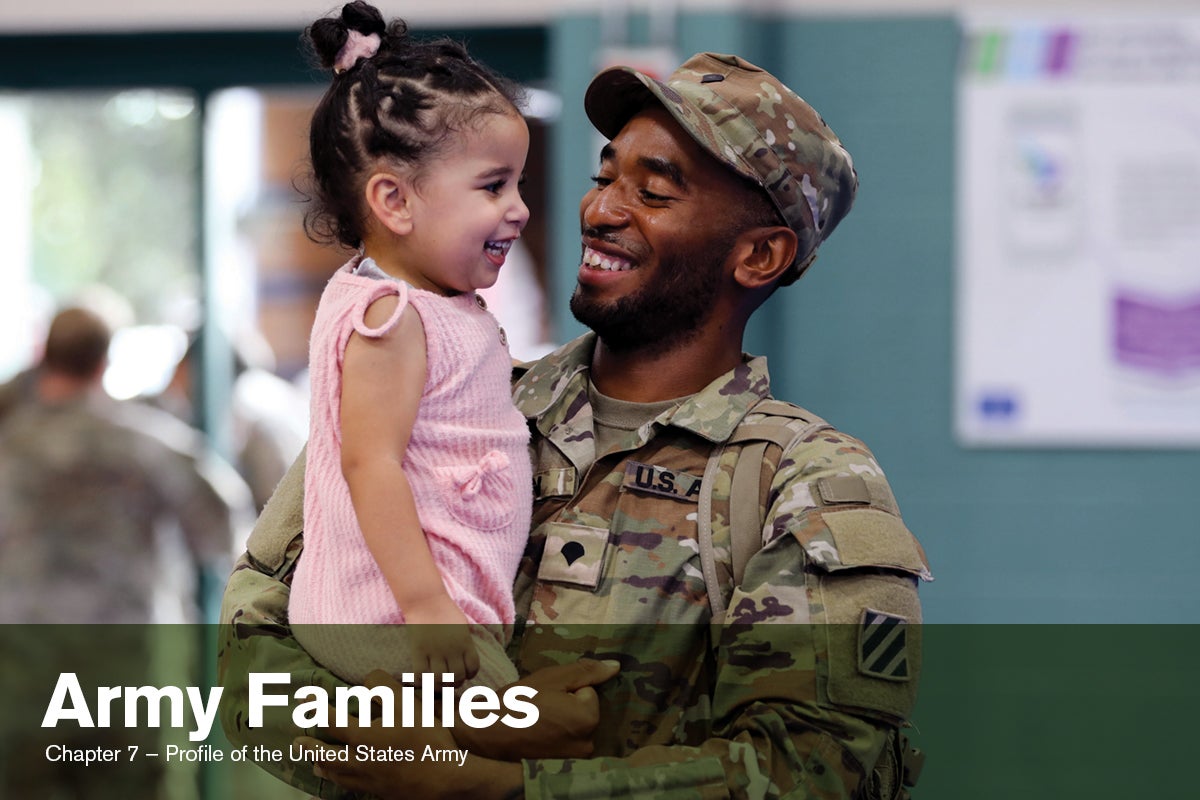
This is Chapter 7 of the 2022 Profile of the United States Army, a top-to-bottom reference handbook that lays out everything you need to know about how and why the Army works—and what it’s doing around the world right now. Links to other chapters can be found at the bottom of this page.
Family Strong
Army Families are the integral link between Soldiers and the Army’s ability to maintain ready and responsive forces. Providing Soldiers, families and civilians with the best quality of life is essential both to recruiting and retaining the all-volunteer force. Soldier and Family programs are an investment in our most valuable asset—our people. More than half of American Soldiers are married and/or have children; most of these children are five years old or younger.
America’s investment in the families of its Soldiers is unmatched by any other country in the world. Committed to maintaining and even improving this standard, the U.S. Army provides the care, support and services necessary for family readiness. The primary means of accomplishing this is through the Quality of Life (QoL) initiatives that consistently achieve broad, positive results.
Quality of Life Initiatives
“Our Soldiers, civilians and families deserve the best quality of life possible, and I will strive to continue improving our Army housing, healthcare, childcare and spouse employment opportunities.”
–The Honorable Christine E. Wormuth,
Secretary of the Army
People are the Army’s greatest strength. QoL programs promote the health and well-being of these people, increasing recruiting and retention and reducing overall stress and uncertainty. Understanding that improved QoL for Soldiers, Army civilians and families is directly tied to increased Army readiness, the Army People Strategy emphasizes vital issues such as:
- housing: ensuring Soldiers and families have safe, quality, on-post housing and barracks;
- healthcare: creating an integrated, efficient and effective healthcare system;
- child care: providing accessible, affordable child-care programs;
- spouse employment: helping military spouses find meaningful employment and careers by maximizing hiring authorities and bolstering existing partnerships;
- permanent change of station (PCS) moves: improving and streamlining relocation policies and initiatives for Soldiers and their families; and
- support and resilience: emphasizing QoL for Soldiers and their families particularly at installations that experience additional challenges, both at remote and austere locations, but also across the Army.
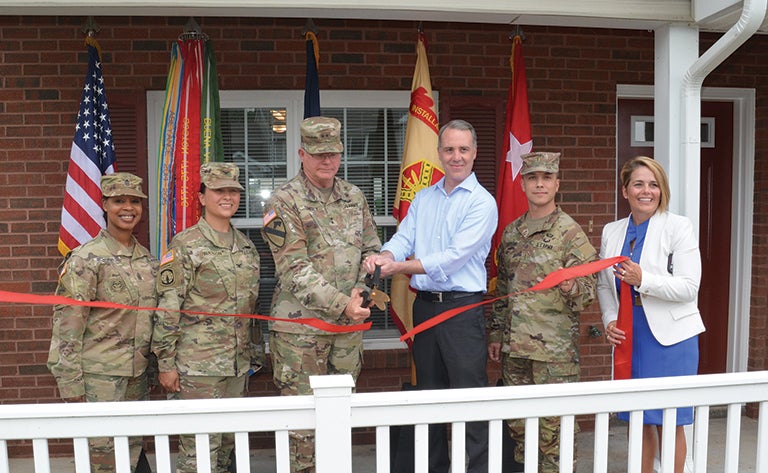 Major General Mark T. Simerly, Combined Arms Support Command and Fort Lee commanding general, and Jason Frenz, Vice President of Development for Hunt Military Communities, cut a ribbon to officially open a newly renovated set of quarters in the Harrison Villa privatized housing area, 15 July 2022 (U.S. Army photo by Patrick Buffett).
Major General Mark T. Simerly, Combined Arms Support Command and Fort Lee commanding general, and Jason Frenz, Vice President of Development for Hunt Military Communities, cut a ribbon to officially open a newly renovated set of quarters in the Harrison Villa privatized housing area, 15 July 2022 (U.S. Army photo by Patrick Buffett).Housing
On 1 August 2021, the Army implemented the Military Housing Privatization Initiative (MHPI) Tenant Bill of Rights at all installations, providing Soldiers and families negotiating power with private companies, including a process for resolving disputes and gaining access to maintenance records.1 The Army’s privatized housing providers have committed to a $3 billion investment in MHPI housing over the next 10 years to make or accelerate needed improvements across the portfolio.
Child Care
The Army is implementing strategies to improve access to the best child care available. This includes investing about $120 million in seven new Child Development Centers by Fiscal Year 2027 and continued investment in fee assistance to reduce the cost of off-post child-care services where on-post services are unavailable.
Healthcare and Support & Resilience
The Army places special emphasis on locations with critical and unique needs. Recent improvements include: assignment incentive pay in qualifying locations; improved health care provider staffing and behavioral health services; a spiritual readiness initiative that connects chaplains and behavioral health professionals with first-term Soldiers; and work with local education authorities to support virtual education pilot programs and efforts.
The Army is transforming the Exceptional Family Member Program (EFMP) to provide comprehensive medical, assignment, legal and human services support to Army families with special needs. A new digital platform is expected to streamline enrollment, to make assignment coordination and family support access easier and to synchronize all aspects of care for these family members.
Additional Initiatives
The Army has now signed 100 intergovernmental support agreements (IGSAs) that save the Army $28 million every year, assisting in minimizing costs to the Army, enhancing QoL, building resiliency and deepening bonds with local communities. Among other things, IGSAs have improved: emergency response time at Fort Detrick; utility resiliency at Fort Carson; environmental stewardship at Fort Benning; and life skills programs at Fort Drum.
Along with promoting spiritual, financial and medical readiness, the Army continues to promote QoL through morale, welfare and recreation (MWR) programs and in offerings at installation Army Community Service centers.
Connect with Your Community: Digital Garrison2
The U.S. Army has partnered with the Army & Air Force Exchange Service (AAFES) to create the Digital Garrison mobile app. Digital Garrison integrates information from AAFES and two website networks operated by Installation Management Command: home.army.mil/imcom/index.php/garrisons and ArmyMWR.com.
Digital Garrison, currently available in app stores for download to Android and Apple devices, is a one-stop information source for Army communities. The app puts real-time information into the hands of Soldiers, families and civilians and keeps military communities connected, a key part of readiness and resiliency. On any Digital Garrison-enabled post, app users have secure access to facility information; QoL services; resources about their local exchange; Army Family and MWR programs; and other services. More than 60 installations are already enabled for participation; plans are in place to enable further installations.
Military Family Readiness System3
The Military Family Readiness System is a collection of programs and services operated by DoD and other federal, state and community-based agencies and organizations. It enhances military family readiness and resilience and promotes the well-being of each and every military family, regardless of activation status or location. Collaboration and integration across the system promotes positive outcomes for servicemembers and their families across the domains of career, social, financial, health and community engagement. In total, there are 66 Garrison Army Community Service Centers, 396 Army National Guard Family Assistance Centers and 34 Reserve Family Programs Sites, all enabled to serve Soldiers and their families. They provide a wide range of assistance, including:
- mobility and deployment assistance: services designed to promote positive adjustment to deployment, family separation, reunion and reintegration;
- relocation assistance: information, education and referrals to help prepare servicemembers and their families for PCSing—including moving costs, housing options, spouse employment opportunities, schools, community orientation, settling in at their new duty location and much more;
- financial readiness: financial education and counseling services to provide tools and information that help in the achievement of financial goals and address financial challenges, covering topics such as consumer education, budgeting, debt liquidation, retirement planning, savings and investment counseling;
- spouse education and career services: programs to include career exploration opportunities, education and training, employment readiness assistance and employment connections;
- personal and family life education: education and enrichment services to increase resilience, build and maintain healthy relationships and strengthen interpersonal and problem-solving skills;
- emergency family assistance: services to promote short- and long-term recovery and a return to a stable environment after an emergency;
- domestic abuse prevention and response services: education, support services and treatment to promote healthy and safe intimate relationships, reduce the occurrence of domestic abuse and address domestic abuse when it occurs;
- child abuse prevention and response services: services to promote positive parent-child relationships, prevent child abuse and address abuse when it occurs;
- new parent support program: home visitation services designed to help new parents adapt to parenthood through education, playgroups, classes and access to books and publications on parenting;
- EFMP support: for families who have special medical and/or educational needs related to EFMP enrollment and/or the assignment coordination process, non-clinical case management and relocation support;
- non-medical individual and family counseling: short-term, confidential, non-medical counseling services to address topics related to personal growth and positive functioning; and
- transition assistance: advice and practical help for servicemembers and their families as they prepare to retire from their military careers.
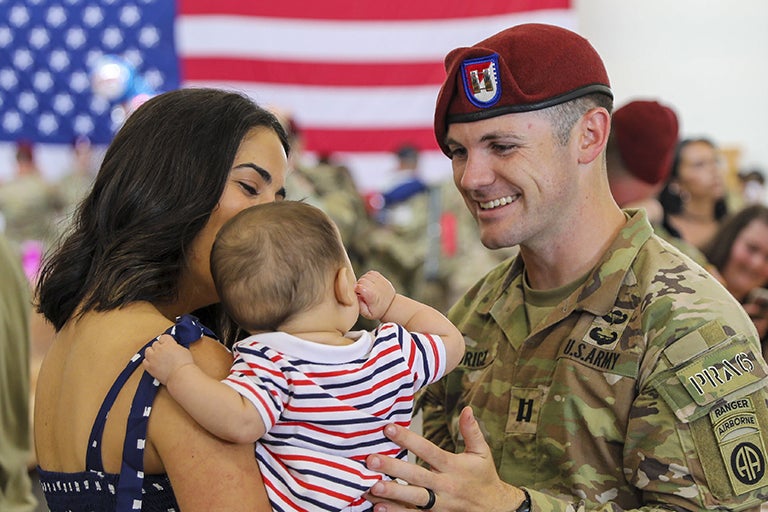 U.S. Army Paratroopers assigned to the 82nd Airborne Division return home to Fort Bragg, North Carolina, on 12 July 2022. Elements of the 82nd Airborne Division Immediate Response Force deployed to Poland as part of Task Force-82 to support the United State’s decision to increase presence and activities in Europe (U.S. Army photo by Specialist Lilliana Fraser).
U.S. Army Paratroopers assigned to the 82nd Airborne Division return home to Fort Bragg, North Carolina, on 12 July 2022. Elements of the 82nd Airborne Division Immediate Response Force deployed to Poland as part of Task Force-82 to support the United State’s decision to increase presence and activities in Europe (U.S. Army photo by Specialist Lilliana Fraser).Military One Source
Military OneSource provides information, resources and support for servicemembers across the Total Army and for their families and survivors. Provided at no cost, Military OneSource gives exclusive access to programs, tools and benefits designed to help ensure that servicemembers and their families are mission-ready and able to thrive in both their military and post-military lives.4 As a DoD program, Military OneSource offers a wide range of services designed exclusively for the military community. Services include help with relocation, tax support, financial planning, health and wellness coaching, non-medical counseling and specialty consultations for spouse employment, education, adoption, elder care, special needs and much more.
Military OneSource offers one-on-one support to help navigate any challenge military life may bring your way. Its services are accessible 24/7; servicemembers and their families can call Military OneSource at 800-342-9647 or visit MilitaryOneSource.mil. Consultants can help with:5
- relocation services to create a personalized moving plan for your next PCS;
- certified financial experts to balance your budget or prepare your taxes;
- timely translation, certification and notarization of qualifying legal documents;
- career counselors for progression and achievement, including business ownership;
- language interpretation services in more than 150 languages;
- wellness coaches to set health goals, plans and support;
- adoption consultants who are familiar with the financial and legal implications of adoption—and the concurrent military benefits, allowances and reimbursements;
- education consultants who provide counsel on financial aid, scholarships, tutoring and college options; and
- housing and medical consultants who provide guidance on housing options and in understanding benefit and care options for family members who need medical assistance.
Reserve Component Family Programs
Army Reserve Family Programs6
Army Reserve Family Programs (ARFP) is a comprehensive blend of QoL programs that DoD supports. ARFP staff serve as the primary coordinating resource, providing a multitude of unit and community-based services that foster the growth, development and readiness of Soldiers and families assigned to each command.
ARFP provides a unit and community-based solution that connects people to people. By pinpointing families in need and available local community resources, the ARFP professionals can quickly align Soldiers’ families with the ideal resources, providing installations with the appropriate services in the right place and the right time.
National Guard Family Programs: Military Family Support Centers7
Family Support Centers provide a variety of referral-based services to geographically-dispersed families and retirees from all military components. Services include, but are not limited to: ID cards and Defense Enrollment Eligibility Reporting System enrollment; TRICARE and military medical benefits education; emergency financial services; legal information and referral; crisis intervention and referral; and community information and referral.
The National Guard Family Program supports and educates families at every stage of the National Guard life. Each state and territory has a state family program director, staff and volunteers who carry out the program’s vision of enhancing QoL for National Guard members, their families and their communities.
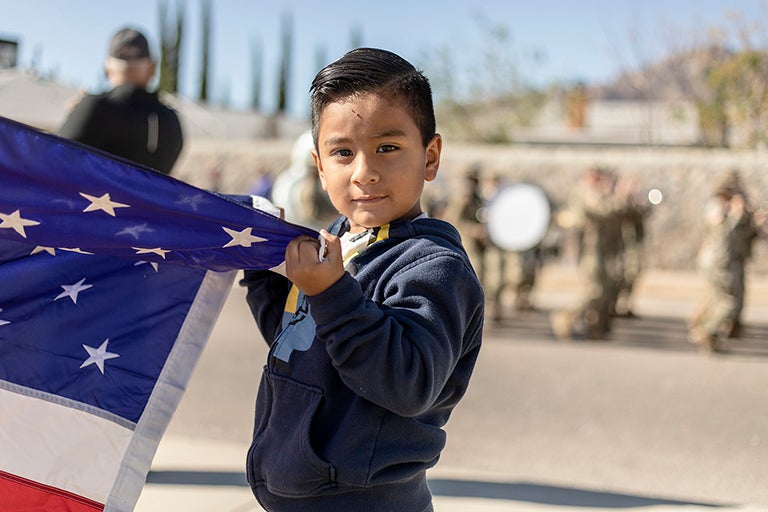 Junior Armendariz pauses for a photo with the American flag at Todd Ware Park in El Paso, Texas, 11 November 2021. “He’s always looking at police officers and military people, he’s always thanking them,” said his dad, Rafael Armendariz, during the 2021 Flags Across America Northeast El Paso Veterans Day Parade and Ceremony. “He’s an example to me. We’re grateful to everybody” (U.S. Army photo by David Poe).
Junior Armendariz pauses for a photo with the American flag at Todd Ware Park in El Paso, Texas, 11 November 2021. “He’s always looking at police officers and military people, he’s always thanking them,” said his dad, Rafael Armendariz, during the 2021 Flags Across America Northeast El Paso Veterans Day Parade and Ceremony. “He’s an example to me. We’re grateful to everybody” (U.S. Army photo by David Poe).Army Community Service
The mission of Army Community Service (ACS) is to deliver comprehensive, standardized, coordinated and responsive Soldier and family readiness services to support the readiness and well-being of military and civilian personnel, retirees and families, regardless of geographic location. Each program maximizes technology and resources, adapts to unique installation requirements, eliminates duplication in service delivery and measures service effectiveness.
Army Family Web Portal8
The Army Family Web Portal (AFWP) is ACS’ newest virtual resource to get connected and stay connected: visit ArmyFamilyWebPortal.com/home. It allows community members to access information on ACS services, search volunteer opportunities, submit QoL issues and much more. Its services include:
- Issue Management System (IMS): The Army Family Action Plan (AFAP) IMS allows registered and unregistered users to submit online issues regarding their communities or other aspects of Army life. Issues are reviewed and managed by AFAP staff, and users can track the status of their own submitted issues and others that are currently under review.
- Online Learning Management System: Training is a fundamental component of AFWP that allows site users to take full advantage of the applications and tools available around the world. Participants typically receive a certificate (which may be used for promotion points, depending on the course) after course completion. Internet access is the only requirement for taking the computer-based training.
- Virtual Soldier and Family Readiness Group (vSFRG): The Soldier and Family Readiness Group (SFRG) acts as an extension of the unit command in providing official and accurate command information to Soldiers and their families. vSFRG is a tool that commanders can use to securely communicate with their SFRG membership regardless of a unit’s mission or deployment status—24/7 from anywhere in the world. A unit can customize their vSFRG site and control the content on its page. vSFRG is another way commanders can connect with their Soldiers and families, provide access to on- and off-post resources and offer a network of support.
- Volunteer Management Information System (VMIS): Volunteers play an integral role in the lives of Soldiers and their families throughout the military community. VMIS assists the Army Volunteer Corps in managing these dedicated volunteers and allows volunteers a way to track their hours, awards, trainings and certificates.
Securing the Financial Frontline9
The Army’s Financial Readiness Program (FRP) is a military lifecycle-based financial education and counseling program that bolsters Soldiers’ financial fitness throughout their careers. The Army’s central theme for promoting financial literacy—and the name of their website—is “Secure the Financial Frontline.” Their site offers a wide variety of financial educational resources for Soldiers and families.
Army Emergency Relief (AER)10
AER is the Army’s own nonprofit financial assistance organization. It was incorporated as a 501(c)(3) nonprofit organization on 5 February 1942 by the secretary of war and the chief of staff of the Army; among other things, it provides Soldiers and their families with zero-interest loans and grants to assist them in overcoming financial challenges.
The work of AER is conducted within the Army structure by designated AER officers, company commanders or first sergeants; at Army installations worldwide, garrison commanders cooperate through the AER network. In total, over 200 AER officers are stationed at 70 Army installations across the globe, directly supporting the Army team with expertise in more than 30 different areas of focus.
One way that assistance can be provided is through the Quick Assist Program, in which the company commander or first sergeant can approve assistance up to $2,000. Assistance can also be provided by:
- AER officers, in amounts up to $3,000;
- a garrison commander or a command sergeant major, in amounts up to $4,000; or
- the AER headquarters team, which approves requests above $4,000.
Ultimately, the financial readiness of Soldiers and their families is a priority for the Army as it has a direct effect on mission readiness. AER provides Army leaders an asset in ensuring a ready source of financial assistance to Soldiers and their families. By providing zero interest loans, AER helps build Soldier and family resiliency and instills financial responsibility.
The Army’s annual AER campaign takes place from 1 March through 15 May. AER officers or unit representatives can provide information on how to donate with cash, check or allotment. Donations can also be made online at ArmyEmergencyRelief.org.
MWR Programs and Services11
MWR provides activities and facilities within the military structure that contribute to increased morale of Soldiers and their families, thereby enhancing the readiness and resilience of the force. Depending on duty station, services and activities may include:
- bowling lanes, golf courses, boating, horseback riding, scuba diving or flying;
- classes in auto repair, woodworking, painting, photography or music;
- equipment rental for camping, canoeing, fishing, hunting or skiing;
- special programming for single servicemembers ages 18–25, including trips, concerts and tours;
- fitness, aquatics and sports programs—if your servicemember is not on or near an installation, more than 3,000 YMCAs and private fitness facilities offer military memberships;
- campground sites that include recreational vehicle pads, pop-up camper sites, tents, cabins, hotels or yurts;
- recreational lodging and Armed Forces Recreation Centers;
- leisure travel services that help with vacation planning, offer discounted vacation packages and provide low-price tickets to sporting events, concerts and attractions; and
- Military Lodging/Armed Forces Recreation Centers, which include both recreational lodging and official PCS/temporary duty lodging.
The DoD MWR Digital Library12
The integrated DoD MWR Libraries website is accessible to servicemembers and their families. All in one place, it provides:
- free resources, available 24/7;
- high-quality MWR digital library databases; and
- a wide variety of new materials.
Its digital collection includes e-books, audiobooks, movies, academic support (tutors), professional development, career transition assistance and a vast array of learning resources and online content for all ages and interests.
 4th Infantry Division Soldiers take a hike with the Better Opportunities for Single Soldiers (BOSS) program, 18 February 2022, at Ouray, Colorado. BOSS is an Army program single Soldiers can participate in to enhance their quality of life, contribute to their community through community service activities and assist in the planning and execution of their own recreation and leisure events (U.S. Army photo by Specialist Scyrrus Corregidor).
4th Infantry Division Soldiers take a hike with the Better Opportunities for Single Soldiers (BOSS) program, 18 February 2022, at Ouray, Colorado. BOSS is an Army program single Soldiers can participate in to enhance their quality of life, contribute to their community through community service activities and assist in the planning and execution of their own recreation and leisure events (U.S. Army photo by Specialist Scyrrus Corregidor).Better Opportunities for Single Soldiers (BOSS)13
The mission of the BOSS program is to enhance the MWR and QoL for single Soldiers—thereby increasing retention and sustaining combat readiness. Garrison BOSS programs are managed by a senior enlisted advisor, an MWR advisor and a BOSS president. BOSS serves the single Soldier and single parent community across the Total Army and all services. In the 74 BOSS communities that exist across the Army, programming is facilitated through three core components aimed at maintaining a balanced life: leisure and recreation, community service and QoL.
- Recreation and Leisure: Activities are planned by the BOSS council working in conjunction with the MWR advisor and command sergeant major. These events are geared toward the interests of the single Soldiers on any given installation.
- Community Service: BOSS makes a difference by facilitating single Soldiers in volunteering in community projects and events. Always voluntary in nature, Soldiers find this to be personally rewarding.
- Quality of Life: This includes those issues that Soldiers can directly or indirectly influence to enhance their morale, living environment or personal growth and development. Issues raised during BOSS meetings are directed to the appropriate command or staff agency for resolution on the installation. Army-wide issues are forwarded to the Army Family Action Plan Conference for possible Department of the Army resolution.
Child, Youth and School (CYS) Services
The mission of Army CYS Services is to support readiness by reducing the conflict between mission requirements and parental responsibilities, ultimately reducing the stress on families that comes with a military lifestyle.
Army CYS Services provide a continuum of care for children four weeks old to 18 years of age for active and reserve component military and DoD civilian families. Child development, family child care, youth programs and school support services are inspected annually and are certified to operate by DoD.
Child care can be requested on-line through MilitaryChildCare.com. Child care fees are standard across the military services and are based on total family income. Facility-based child development programs are required by statute to meet national accreditation standards. Meals and snacks are in accordance with USDA nutritional guidelines. Staff, family child-care providers, contract instructors and volunteer coaches undergo background checks and training prior to working with children.
CYS Services include:
- Child Development Centers (CDCs) serve children six weeks old to five years old in on-post facilities that typically operate 12 hours per day or more, depending on installation mission requirements. They provide full-day, part-time and hourly care options, special openings and extended hours services.
- Family Child Care (FCC) serves children four weeks old to 12 years old in government-owned, leased quarters or in privatized housing. FCC providers receive oversight from the CYS Services program, but they operate as independent contractors. FCC homes can be located on post and in garrison catchment areas. FCC homes offer full-day, part-time and hourly care in addition to providing extended duty day, evening, weekend and overnight care. They may care for children for extended periods of time.
- School Age Care (SAC) programs serve children six to 12 years old in on-post facilities during non-school hours, including before and after school and during school beaks. Programs are available on a regularly scheduled or drop-in basis to accommodate both short-term child care and recreational use or child care for working parents. Kindergarten programs may be located in SACs or CDCs.
- School Support Services help ease the transition of Army school age children as they move between “sending and receiving” school systems. Army School Liaison Officers are assigned at each installation to assist families with school issues and transitions.
- Youth Sports & Fitness programs serve children three to 18 years old through a variety of team and individual sports, skill building clinics, fitness activities, instructional programs and developmental sports for young children. Professional youth sports administrators certify volunteer coaches for each sport.
- Youth Programs serve middle and high school youth in on-post facilities before and after school and during school breaks, evenings and weekends. Army youth programs are affiliate members of Boys & Girls Clubs of America, which partner with the Army to provide a diverse program to meet the developmental needs of youth.
- Community Based Programs help Army families to locate and pay for civilian child care when installation care is not available. Child-care providers must be state licensed, annually inspected and nationally accredited by a DoD-approved accrediting agency. Army Fee Assistance mitigates the higher cost of civilian child care for children from birth to 12 years old who need full-day, part-time, or before and after school care—and care during school break or summer camp. Child Care Aware of America administers the program in all 50 states: usa.ChildCareAware.org/fee-assistancerespite/military-families/army.
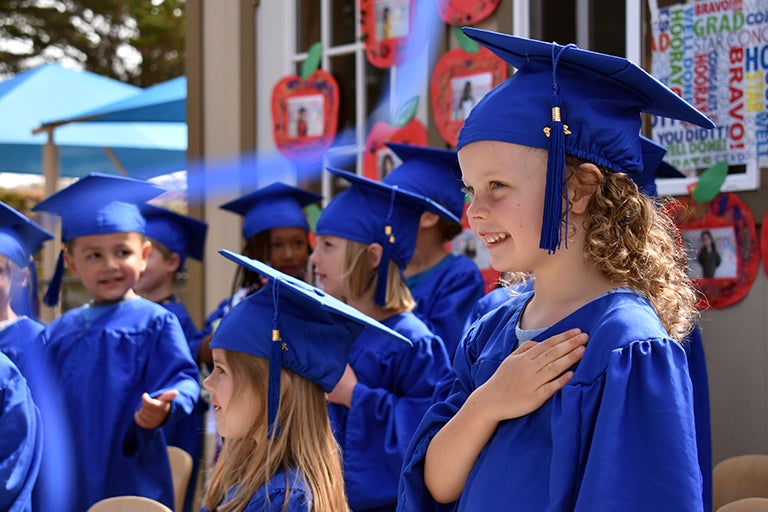 A Strong Beginnings graduate stands ready for the Pledge of Allegiance during the program’s graduation ceremony at the Presidio of Monterey Child Development Center, Ord Military Community, California, 3 June 2022 (U.S. Army photo by Winifred Brown).
A Strong Beginnings graduate stands ready for the Pledge of Allegiance during the program’s graduation ceremony at the Presidio of Monterey Child Development Center, Ord Military Community, California, 3 June 2022 (U.S. Army photo by Winifred Brown).Association of the United States Army (AUSA) Family Readiness
In line with AUSA’s mission to educate, inform and connect, the AUSA Family Readiness Directorate is dedicated to providing Army families with the tools, resources and connections needed to build and enhance their ability to manage the ins and outs of the military life.
AUSA Family Readiness supports the needs and interests of all Army families through worldwide chapters made up entirely of volunteers. Find an AUSA Chapter near you: ausa.org/search/chapters.
Family Readiness provides education and connections to relevant information and resources through the Amy Matters podcast series, articles and publications, social media, year-round expositions and symposiums, various virtual and in-person events, forums and professional development, scholarships, Operation Deploy Your Dress and advocacy efforts.
AUSA’s Family Readiness team provides a system of support. It comes from a collaboration of efforts that support the Soldier and the family holistically, granting access to a wide range of resources, programs and services. Army families have resiliency and grit; no matter where they are on their Army journey, they can continue to build and enhance their system of support. Army Families embrace this unique lifestyle, making them Army Strong and family strong.
AUSA Volunteer Family of the Year
This program honors and recognizes the importance of families and volunteers to the success of the Army mission. Each year, AUSA chooses one family who has embodied the spirit of selfless sacrifice on behalf of their immediate community and the Army as a whole.
In October 2021, AUSA was pleased to present the award of Volunteer Family of the Year to Sergeant 1st Class Justin Dixon of the 82nd Airborne Division at Fort Bragg, North Carolina. Dixon and his wife, Tawni, who have a toddler, Cameron, spend hundreds of hours volunteering and giving back to their military community. Both volunteer for their local community, the Fort Bragg community and unit programs. In the last two years, Justin has volunteered more than 350 hours of his time. He founded a Facebook outreach group for veterans to connect; specifically, he works to provide fishing trips and equipment to veterans with post-traumatic stress disorder and physical disabilities, and he plans fishing trips for wounded warriors from the Fort Bragg area.
Tawni Dixon has volunteered more than 600 hours, including working with the Armed Services YMCA to organize canned food drives and to raise money for hygiene items for families in need, and she initiated a program which recognizes high school family members of 82nd Airborne Soldiers for their volunteer work. She also served as an SFRG leader, organizing events for families when their Soldiers were deployed and raising money throughout the unit’s deployment, collecting more than $7,000 in donations for single Soldiers and 151 care packages for the Soldiers’ return home. Tawni also volunteers with the 82nd Airborne Division’s integration course, answering questions and helping families new to the division and Fort Bragg, and has worked with a local Girl Scout troop to raise money for paratroopers.
The Dixons were the Military Family of the Year for North Carolina in 2021 and the Fort Bragg Family of the Year in 2020. They have both demonstrated outstanding leadership in planning and organizing major events that have resulted in tangible benefits to both their community and Army families stationed at Fort Bragg and across the nation.
★ ★ ★ ★
2022 Profile of the United States Army
Foreword
Chapter 1: National Defense
Chapter 2: The Land Component
Chapter 3: Army Organization
Chapter 4: The Soldier
Chapter 5: The Uniform
Chapter 6: The Army on Point
Chapter 7: Army Families
Chapter 8: Army Commands
Chapter 9: Army Service Component Commands
Chapter 10: Direct Reporting Units
- “Military Housing Privatization Initiative Tenant Bill of Rights,” 1 August 2021.
- Eric Kowal, “New digital garrison app puts Picatinny Arsenal information at your fingertips,” Army News Service, 9 April 2021; Devon Suits, “New Army Digital Garrison app serves as guide to on-post services,” Army News Service, 11 August 2020.
- Military OneSource, “Military Family Readiness System,” 1 June 2021.
- DoD, “Military OneSource Is Now Available to Veterans and their Families for a Full Year After Separating from the Military,” 13 August 2018.
- Marine Corps Community Services, “10 Things You Didn’t Know Military OneSource Offered.”
- U.S. Army Reserve, “Army Reserve Family Programs.”
- National Guard, “Family Services.”
- Army MWR, “Army Family Web Portal.”
- Headquarters, Department of the Army, “Army Financial Readiness,” Stand-To!, 4 June 2021.
- Army Emergency Relief, “Army Emergency Relief,” Stand-To!, 27 March 2020.
- Military OneSource, “About Morale, Welfare and Recreation: Supporting the Military Community,” 12 August 2021.
- Military OneSource, “Morale, Welfare and Recreation Digital Library,” 31 January 2022.
- Army MWR, “About B.O.S.S.”

